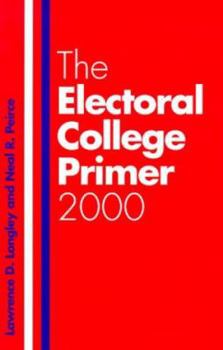The Electoral College Primer
Select Format
Select Condition 
Book Overview
Like you we know that time is a precious commodity these days with packed schedules, testing requirements, and more. The newest addition to our product line can help you make the most of the time you... This description may be from another edition of this product.
Format:Paperback
Language:English
ISBN:0300080360
ISBN13:9780300080360
Release Date:September 1999
Publisher:Yale University Press
Length:253 Pages
Weight:0.70 lbs.
Dimensions:0.6" x 5.5" x 8.3"
Customer Reviews
2 ratings
Very interesting, and ironic in light of recent events
Published by Thriftbooks.com User , 23 years ago
I am writing based on the 1996 edition. This is a book that focuses on the workings and potential problems of the Electoral College. There is much historical discussion, but the book is primarily concerned with today's Electoral College. Much of this book is adapted from Pierce's The People's President (1968 & 1981, which I also recommend). In light of recent events, this book is very relevant. The authors strongly feel that the Electoral College should be abolished in favor of a direct popular vote. The authors stress the well-known criticisms regarding the "wrong winner", popular vote percentage distortion, faithless electors, and third-party shutouts. The book especially stresses the potential for chaos in a three- way race, opening with fictitious but ironic 1996 race... Election night: Bob Dole wins a narrow popular plurality. Bill Clinton wins an narrow electoral plurality. Ross Perot carries several states including Texas. With no electoral majority, the drama is just beginning... Mid-December: Both parties have persuaded some Perot electors to defect - but not enough. The Electoral College deadlocks, so the vote goes to the House. Early January: The Republicans have a slim majority in the new House - but not by states (it's one-state-one-vote). The House deadlocks. Meanwhile, the VP vote goes to the Senate, which must choose between Al Gore and Dole's running mate Lamar Alexander. Since the new Senate is 50-50, it deadlocks too. (Note: the authors maintain that the outgoing VP cannot break the tie in such a case - an open question which would surely go to the Supreme Court.) Inauguration Day: Still no decision. With the presidency and vice-presidency vacant, House Speaker Newt Gingrich becomes Acting President, as per the 1947 Presidential Succession Act. But... The House can keep voting until Dole, Clinton, or Perot wins 26 states. The Senate can keep voting until Gore or Alexander gets 51 votes. If the Senate decides first, the new VP would also be Acting President. Acting President Gingrich must govern knowing that either House can replace him at any time... January 1999: The newly elected Congress chooses a president. America's longest election is finally over. The balance of the book is divided between historical narratives and mathematical analysis of how the electoral and popular votes diverge. I found the narratives very interesting, the analysis less so. A chapter entitled "Recent Crisis Elections" discusses 1948, 1960, 1968, 1976, 1980, and 1992. I disagree with the title; the only crises were 1800, 1876, 2000 and possibly 1824. However, the chapter is quite interesting - 1948, 1960, and 1968 almost went to the House. Particularly notable are the Alabama 1960 vote (a hybrid slate of 6 unpledged and 5 Kennedy Democrats won - so what was Kennedy's real popular vote?), the Hawaii 1960 rival electors, and the 1976 election night (which dragged on until 3:30 AM and had a retraction - sound familiar?). Other cha
Very Informative Book
Published by Thriftbooks.com User , 23 years ago
This is the perfect book for anyone who has never quite understood how the electoral college works (or, even, why we still use it) in national elections for the President. It highlights the historical foundations for its formation, as well as specific, historical examples--where its existence has proven to be questionable (at best), in terms of electing the President of the U.S. This book's timeliness can be seen in the current presidential-election situation--which has called into question the electoral college's capability, in being able to elect "the people's choice" to the presidency.





